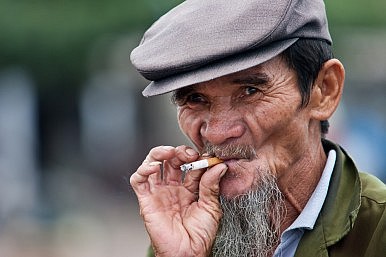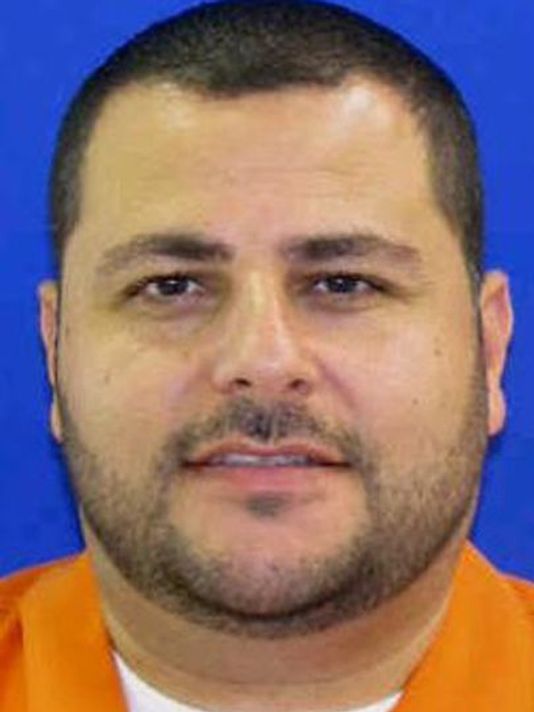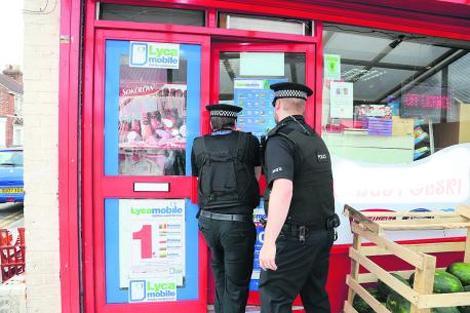
Vietnam’s Tobacco Problem
Campaigners are beginning to tackle smoking in one of the world’s most tobacco-friendly countries.
In a small street-side cafe deep within Hanoi’s labyrinthine Old Quarter, a group of middle-aged men sit drinking bitter iced tea, swapping stories, and smoking from a huge bamboo water pipe. Their attention is caught by a foreign tourist ordering a drink at a nearby table, and one of them beckons in broken English for him to join the group.
“You smoke, my friend?” he asks, pointing to the pipe. “It’s very good. Very strong. Makes you strong too.” Apologetic, the visitor refuses. “But you are in Vietnam,” the man insists, breaking into a broad gap-filled smile of yellowing teeth. “Men smoke here.”
http://thediplomat.com/2014/07/vietnams-tobacco-problem/
Lear MoreKimberley police confiscate illicit tobacco
Police in Kimberley in the Northern Cape have raided 30 businesses, confiscating illicit tobacco with a street value of R50 000. Police spokesperson Sergio Kock says the raids happened in De Beers, Colville, Greenpoint and Beaconsfield. He says fines were also issued to business owners for allegedly contravening the Tobacco Act as well as the Customs and Excise Act.
Kock says: “The illicit cigarettes are usually identified with the absence of the SA diamond stamp…and the cigarettes also have incorrect health warnings and the quit line number is usually also not available on the cigarettes packs.”
Lear More
Tackling cheap illegal tobacco roadshow comes to Swindon
Shoppers will be warned about the dangers of illegal tobacco and encouraged to report the issue, when a campaign roadshow rolls into Swindon town centre on Friday, 4th July. Illegal tobacco is known to make it easier for children to start smoking because it is sold at pocket money prices, meaning that young people could fall prey to the lethal habit which claims the life of every 1 in 2 smokers. Illegal tobacco is also known to make communities more attractive to criminals.
Lear More

Cigarette smuggling suspect pleads guilty
The No. 2 man in a multimillion-dollar cigarette smuggling operation based out of West Ocean City has pleaded guilty to corruption charges and now faces prison time in New York state.
Samer Ramadan, 40, pleaded guilty June 27 to the top charge against him of enterprise corruption, according to the New York Attorney General’s Office. In a statement in open court, he admitted his role in the operation run by his brother, prosecutors said, including stating that his brother ran the enterprise.
He now faces a prison sentence of two to six years, prosecutors said.
http://www.delmarvanow.com/story/news/local/maryland/2014/06/30/cigarette-smuggling-ring/11779889/
Lear More
Operation smokes out illegal tobacco
TRADING standards seized more than £4,000 worth of illegal tobacco in a raid on shops around the town. Police joined officers from Trading Standards on Thursday in a joint operation to target two shops in Manchester Road following intelligence that they were supplying illegal tobacco.
Illegal tobacco refers to goods that have been smuggled, bootlegged, or counterfeited and any goods which have been manufactured overseas and smuggled into the UK, such as Jin Ling, Raquel, Palace, Manchester and Richman.
http://www.swindonadvertiser.co.uk/news/11308115.Operation_smokes_out_illegal_tobacco/?ref=rss
Lear MoreHike in taxes on Tobacco will encourage smuggling
Reports about hike in duty on tobacco products may not persuade many to give up smoking because of high prices as it is one of the products which bears heavy burden of local and Central taxes, but will certainly be good news for those who smuggle international brands into India and manufacturers of counterfeit products as it would make their trade more attractive because of huge price difference between products of legitimate manufacturers and those who pay no taxes.
Smuggling of cigarettes has become a major security concern for many countries as outfits like Al-Qaida and Taliban’s are turning to illicit trade to finance their activities. According to U.S department of justice bureau alcohol, firearms and tobacco are some of the items which are used to fund the activities of terrorists. In some cases container loads of cigarettes have been intercepted by authorities.
Lear More
Customs team arrests Widnes suspect in ‘£11m tobacco smuggling’ raid
A 56-year-old company director from Widnes has been arrested in connection with a suspected tobacco smuggling fraud worth an estimated £11m. HM Revenue And Customs (HMRC) officers searched a property in the town on Tuesday, where they seized computers, phones and business records allegedly relating to a criminal enterprise. Addresses were also searched in south Armagh in Northern Ireland yesterday as part of the same operation. The arrest follows the seizure of 32m illicit cigarettes and nearly five tons of shisha tobacco by officers from the Revenue’s Customs Service and the An Garda Siochana in Drogheda in Ireland on Tuesday.
Lear More
One in Ten Cigarettes Consumed in the EU in 2013 Were Illegal; Dramatic Rise in Consumption of ‘Illicit Whites’
New KPMG Study for British American Tobacco, Imperial Tobacco, Japan Tobacco International and Philip Morris International
London, June 24, 2014 – One in every ten cigarettes consumed in the European Union in 2013 were illicit, 33% of which were “illicit whites”, an emerging type of illegal, branded cigarettes manufactured for the sole purpose of being smuggled, according to a KPMG study published today. At these levels, EU governments lost approximately €10.9 billion to the illegal market.
KPMG found that while the number of “illicit whites” consumed increased by 15% compared to 2012, overall, the illegal trade of cigarettes in the EU stabilized, declining slightly from a record high of 11.1% in 2012 to 10.5% in 2013. This stabilization was due to a significant decrease in contraband cigarettes, legal cigarettes typically smuggled from low tax countries to high tax countries, as industry, governments and law enforcement increased efforts to curtail this illegal activity.
Lear More
4 face P120-M smuggling raps
MANILA, Philippines – Four persons were charged before the Department of Justice (DOJ) yesterday for allegedly smuggling P120 million worth of galvanized steel and counterfeit products.
Jose Alingasa Jr., owner and proprietor of Titan Movers Enterprises, a firm based in Binondo, Manila; and customs broker Mon Carlo Inciong face charges of violating the Tariff and Customs Code, Republic Act 4109 (Bureau of Product Standards Law), and Article 172 of the Revised Penal Code, Bureau of Customs (BOC) Commissioner John Sevilla said in a statement.
The case stemmed from Titan’s importation of three 20-foot shipping containers of specialized steel products misdeclared as steel coils imported from Australia in February, he said.
Sevilla said the firm did not obtain the required import commodity clearance for the products’ importation.
Titan was one of 70 firms suspended by the BOC last March for failing to comply with rules and procedures on filing import documents. Sevilla said Titan is not a registered Philippine Standard license holder for any product covered by mandatory certification.
http://www.philstar.com/metro/2014/06/24/1338275/4-face-p120-m-smuggling-raps
Lear MoreAntimony offers from China dry up on renewed smuggling crackdown
Tightness along the border between China and Vietnam has increased amid rumours that the Vietnamese government has started to clamp down on shipments of antimony through this route.
In-warehouse Rotterdam prices held at $9,400-9,700 per tonne for standard grade II and $9,500-9,800 for trioxide grade as demand remained sluggish. But a renewed clampdown on smuggled material through Vietnam supported prices. “Smuggling is a big issue for the Vietnamese government and they have said they will stop exports in and out of Vietnam,” a trader told Metal Bulletin. Shipments from small ports in Vietnam have been stopped as part of the crackdown, some said, while others said the government has imposed a 10% levy on material.
Lear More



